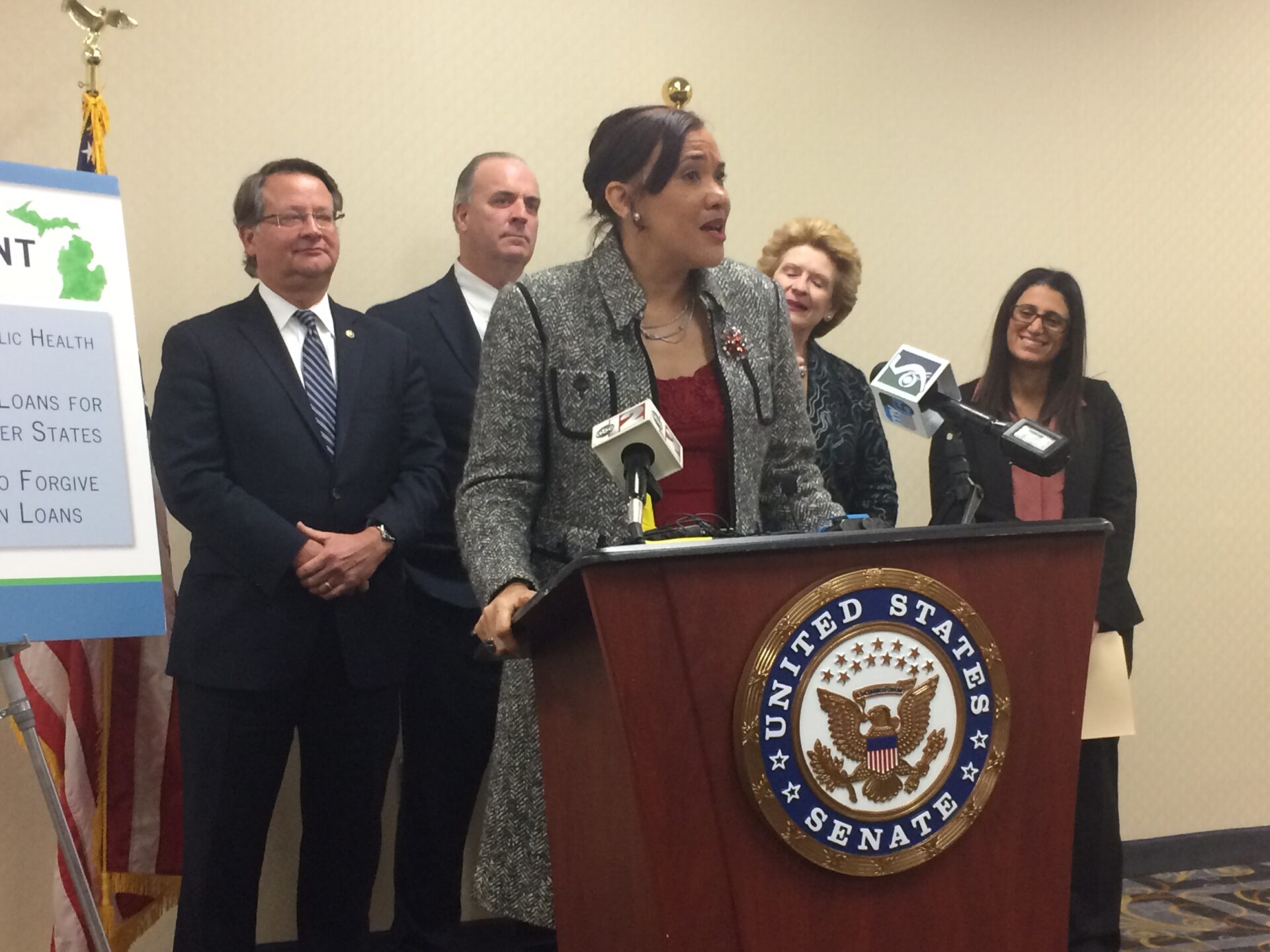By Jan Worth-Nelson
A smiling quintet of powerful Flint champions assembled at the Riverfront Center in downtown Flint today to celebrate approval last week of a $170 million aid package passed by Congress to address the Flint water crisis.
They also clearly called out the State of Michigan, which they agreed is principally at fault for the water debacle, repeating admonitions for the State to step up to its responsibilities not just with apologies but with financial resources.
“I feel like Christmas has already come,” Mayor Karen Weaver said, while noting that much more work needs to be done. She said the city hopes to meet its goal of 1,000 pipes replaced by year’s end, but that in the new year, thanks to the influx of federal money, work will continue to replace “thousands more.
The agreement, part of a larger act officially called the Water Infrastructure Improvement for the Nation (WiiN) Act, S.612, has several parts: $100 million in funding to help fix Flint’s drinking water infrastructure; $20 million in debt forgiveness for loans incurred by the City of Flint in state drinking water revolving funds: funding to activate $200 million in low-interest loans to upgrade water infrastructure in communities in Michigan and across the country; $50 million for public health care needs, especially of children who have been exposed to lead; and an agreement requiring the EPA to warn the public within 24 hour of high lead levels in drinking water if the state fails to do so.

Left to right, Sen. Gary Peters, Congressman Dan Kildee, Mayor Karen Weaver, Sen. Debbie Stabenow, Dr. Mona Hanna-Attisha
Present around the mic along with Weaver were Senators Debbie Stabenow and Gary Peters, Congressman Dan Kildee, and Dr. Mona Hanna-Attisha, the pediatrician whose findings about children’s blood levels broke open the crisis last year. All five spoke, in what Hanna-Attisha described as “a love fest” of mutual appreciation, to an assembled crowd of about 30 media and local officials.
It was clear those at the podium were dissatisfied with the state’s role and contributions, and with federal funds now approved, they expect the state to “do more,” as Peters said. Actions by state officials, particularly in the Departments of Environmental Quality and Health and Human Services, have been determined to have played a large role in the crisis.
The state Attorney General’s office has indicted nine people so far, three in April including one City of Flint water quality supervisor who resigned, and six more in July. The charges, many of which are felonies calling for fines or jail time, included misconduct in office, conspiracy, evidence tampering, and willful neglect of duty. Attorney General Bill Schuette suggested in July more indictments might be forthcoming though no others have been announced as Flint’s advocates pushed for state and federal aid.
“This is an important downpayment on justice for the people of Flint,” Congressman Kildee asserted, “it will make a big difference, but does not by itself provide a total solution to the problem. The State of Michigan more than anybody else is responsible for what happened in Flint.”
“This was an incredible crisis of unimaginable proportions,” Peters said, “It awakened the whole country to what can happen when water system is poisoned, when a government put dollars and cents ahead of what the people in the community really need. We cannot let this lesson be forgotten.”
Stabenow said the funds will help provide “the dignity of knowing, the trust of knowing that when people turn on the tap clean water is coming out of that pipe — after what has been a really outrageous tragedy.”
Peters noted the plan for use of the money has to be be submitted within 18 months, but that the city hopes to get it done far sooner.
“The pipes have got to get fixed,” Stabenow said, noting that $100 million of the allocated funds is an infrastructure grant, not a loan. “This is not replacement money of what the state has contributed, but an addition to it.”
Kildee described how advocates for the package wrestled it through Congress after “using every tool we have,” in the face of repeated efforts to “poison the legislation,” and threatening a government shutdown — by insisting he said, that the federal government does need to be involved. “The three of us made the decision that Flint can’t always be next on the list. This time, Flint’s interests come first,” Kildee said.
“It shouldn’t have taken so long, and it shouldn’t have been so hard,” Kildee said. “Water, clean drinking water, is a basic human right, and it ought not be determined by the average income of the zip code you happen to have been born in. There is a federal interest, a national interest, in making sure every American has access to safe drinking water.”
Referring to the state’s role, Kildee said, “Responsibility and accountability doesn’t mean just the requirement that you apologize, but to do anything in your power to help make it right. That means resources — financial resources. ” He said he, Stabenow and Peters “are going to make sure we do whatever we can to make that happen.”
In addition to observing the bipartisan nature of the votes in both the House of Representatives and Senate, foremost on the minds of city and federal officials is completing the required plan for use of the funds, which must be approved by the Environmental Protection Agency before proceeding.
Asked if the change in administration at the federal level might affect the EPA approval of the plan, Sens. Peters and Stabenow affirmed those who will review it are “career EPA officials,” not political appointments, and, in any event, local officials hope to have the implementation plan in place before the next administration takes over.
Mayor Weaver noted it was just one year ago, just a month after she was elected, that the city issued its emergency declaration. “People told me not to — they said you’re only going to get $5 million…you’re not going to get the resources. But they [those behind her at the podium] were relentless in being a voice for us and making this happen, helping 100,000 citizens in Flint get not only the resources we need, but the resources we deserve as a result of what happened here in the city.
In November, 2015, Weaver was swept into office on a wave of concerns about the water crisis and intense resentment about the emergency manager system imposed on the city by Governor Richard Snyder. She ousted former Mayor Dayne Walling, who had been badly damaged by drinking Flint water on television — being perceived by many as not taking residents’ complaints about the water seriously enough — and not fighting hard enough against the state. Weaver’s administration has been largely focused around the water crisis.
“We’ve gotta fix the pipes — it’s exciting to say that even as of yesterday we had 600 homes,” Weaver said, “and we still want to reach the goal of 1,000 before the end of the year. In the new year, she predicted. thousands of lead service lines would be replaced in the city of Flint.
“We have 29,000 homes that have to have this happen. This money is just what we needed to get started. We have so much work to do…we’re so thankful.” Weaver said. “But the state has got to step up and do their fair share. That’s what we’re expecting and we’re going to continue to speak up. The federal government has stepped up.”
Attisha called the day “awesome,” and extended thanks to the others.”They have been fighting day and night for Flint,” she said. “When they write the history books, when they write about how Flint not only recovered but thrived, these guys are going to be the protagonists.”
She said others — even skeptics — who came to Flint ultimately came to understand the urgency of the situation, and finally found it “unfathomable that in 2016 in America in the richest country in the world in the middle of the Great Lakes there was a city clearly demarcated as poor and who have yet to have access to safe drinking water. This is a human issue, it has been a humanitarian issue.”
But eventually, she said, “Our focus shifted to tomorrow, to how do we preserve the tomorrows of our kids. What happened really threatened the tomorrows of our kids. This city came together to mitigate the exposure, to make sure our kids are healthy tomorrow. Our kids are our todays but they’re also our tomorrow.”
“Flint is not going to be defined by this crisis,” Attisha noted. “We are going to be defined by our response to this crisis.”
Noting the MSU/Hurley Pediatric Public Health Initiative which she said will “flip the story,” she listed many accomplishments of the past year, including a Medicaid expansion, doubled capacity of maternal infant support program, home visiting, early intervention, a new child care center, nutrition access, early literacy, and school health services.
Part of the federal money will provide a “registry” to help follow the Flint children affected by the crisis. “We need to share with the world our best outcomes,” Attisha said. “We will follow the children to get them connected to everything they need and so that in five years, ten years, twenty years the world will know that Flint kids are healthy, Flint kids are strong, Flint kids are smart, and Flint kids are resilient.”
While some descriptions of what caused the water crisis go back decades when urban financing policies and a loss of a tax base began chipping away at the city’s ability to sustain itself, or to the sequence of four emergency managers who ran the city between 2011 and 2016, the crisis is most often said to have begun in April 2014, when under state-appointed emergency manager Darnell Earley the city switched its water source from the Detroit pipeline from Lake Huron to the Flint River. The more corrosive river water was not appropriately treated with non-corrosive chemicals, and lead began leaching into the drinking water from the city’s aging pipes.
EVM Editor Jan Worth-Nelson can be reached at janworth1118@gmail.com.
”







You must be logged in to post a comment.